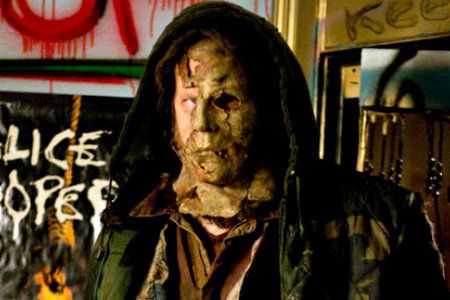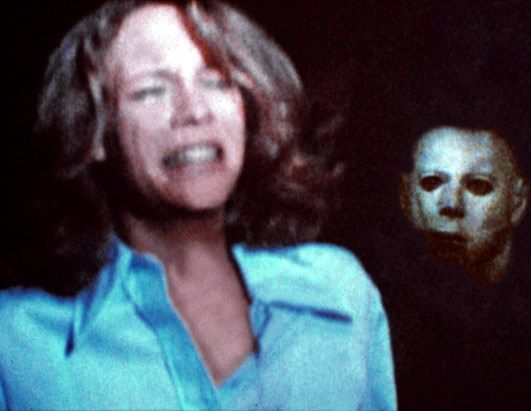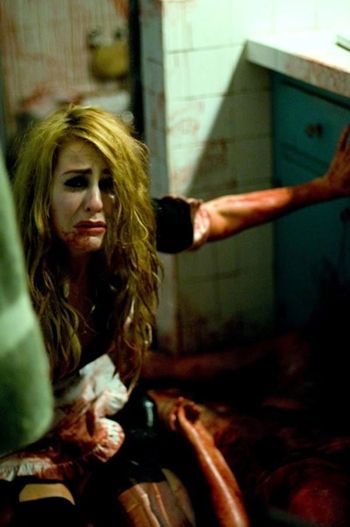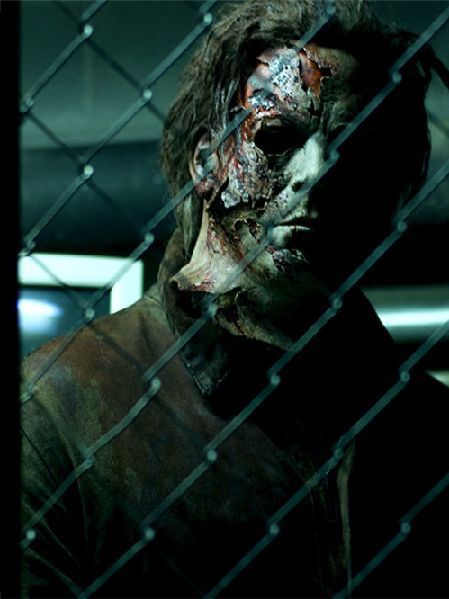Halloween II picks up literally where writer/director Rob Zombie's 2007 Halloween reboot left off: Michael Myers shot down by his little sister Laurie Strode (Scout Taylor-Compton), while Laurie herself is left battered, bloody and half-crazed by her ordeal. The first third of the sequel pretty much revels in the repercussions of the first film, focusing on the survivors and the hell they go through physically, mentally and emotionally as their wounds (literal and metaphorical) are treated and the gore is wiped clean. This first third is also the only real nod to Rick Rosenthal's 1981 sequel to John Carpenter's original Halloween, which was almost entirely set in the hospital Laurie Strode is being treated in following Michael's Halloween massacre.
However, even as Laurie's body heals with time, her mind is still deeply wounded - so much so that almost every time she closes her eyes to sleep she is terrorized by waking nightmares (shot in the surreal style of a White Zombie video), which get a bit tiresome after the third sequence or so. Helping Laurie deal are her best friend Annie (Danielle Harris), also a survivor of the massacre, and Annie's father Sheriff Brackett (Brad Dourif). Meanwhile, Michael's former shrink Dr. Sam Loomis (Malcolm McDowell) is out and about trying to push his much-despised book exploiting the Meyers family history.
A full year passes and as Halloween once again rolls around, the ripples of Michael Myers' violence start to eat away at the peace of the survivors, even as the killer himself appears once again to finish what he started.
Now, when Rob Zombie set out to reboot the Halloween franchise, he made it clear from the get-go that he wouldn't be trying to remake John Carpenter's 1978 original about a mysterious, murderous stalker. Zombie's ambition was to get (literally) beneath the mask of Michael Myers in order to explore larger themes of love, hatred and violence and how pervasive and destructive those forces can be.
It was an interesting concept, especially in the case of Michael Myers. The horror icon wasn't even a "character" in Carpenter's original film - in fact, the closing credits bill Nick Castle, the first actor to play Myers, as "The Shape" and not Michael Myers. Only in the increasingly absurd sequels to Carpenter's film was the modern myth of Michael Myers truly born, and even as that mythology grew, the character of Myers himself became increasingly drab and stale: a robotic murder-man with the supernatural ability to resurrect himself from any and every death.
Flash-forward to Zombie's reboot: I thought the ambition was honorable, but the execution of the film wasn't nearly up to the challenge of its goals. What we ended up with was an overdone origin story about young Michael Myers and his trashy family (yawn), ending in a by-the-numbers slasher flick that paled in comparison to Carpenter's deliciously slow-burning stalker creep-fest.
Which brings us back to Halloween II. With this sequel I think Zombie had a much firmer grasp on themes he was trying to explore and the story he was trying tell in the first installment. And while this sequel certainly does offer a fresh look at the Halloween mythos, with some very strong (read: disturbing) scenes, ultimately Zombie's skills as a filmmaker - while showing signs of vast improvement - still need time to flourish.
The killing scenes in this film are undoubtedly the high point. Gone are the gleefully formulaic and emotionally vapid death scenes of the average slasher flick; actor Tyler Mane (Sabertooth from X-Men) succeeds in portraying Michael Myers like a flesh and blood reality, rather than a supernatural phenomenon. Each time Michael kills, Zombie lets the camera linger over the fallen victim while Mane provides a distinct and disturbing "performance," grunting and huffing as he stabs and stabs and stabs, catches his breath and then stabs and stabs again until the walls are crying blood. They are shockingly real and brutal moments of violence that make you actually feel the despair, horror and all the sick emotions you SHOULD feel when witnessing a murder.
A particular sequence set in the strip club where Michael's mother (Sheri Moon Zombie) used to dance is especially memorable (read: gruesome). You really have to see it to appreciate how brutal it is. Every instance of violence in this film conveys a clear and pointed understanding of Michael Myers' total disconnect from the rest of humanity. Tyler Mane is easily my favorite actor to take on the role, and even though many people freaked when they first heard he would appear maskless for a significant portion of the film, Mane without the mask turns out to be a far more terrifying presence. Through him we can actually see just how insignificant life looks to those shark's eyes glistening through the shadows of "Hobo Myers'" hooded jacket; the big man has never been more real, or more scary.
Equally accomplished is the performance from Scout Taylor-Compton. One of the things I hate about slasher flick sequels is that I almost never believe that the surviving main character has been through any kind of real ordeal - they don't have scars, they seem pretty well adjusted to life again, and if they have ANY mental issues it's usually that corny thought-I-saw-him-in-the-mirror stuff. Not Laurie Strode, though. This girl DOES have scars (the opening scenes of her being treated for her extensive wounds in the ER is pretty gut-wrenching); she's fighting to hold onto any semblance of a life worth living; and all the while she's slipping further and further down the banks of insanity, her mind wholly perverted by the violence and hurt she cannot exercise. And Taylor-Compton pulls off that twisted performance pretty well, IMO. By the end of the film, I truly believe that Laurie ends up where she does, making the last frame of the film (Taylor-Compton's smiling face) truly haunting.
So why is this film, which has some strong positives, earning such horrible reviews and being lambasted by horror fans?
Well, the "surrealist" aspects of the film certainly help to drag it down. The movie opens with a definition lifted from a college psychology text book, explaining the significance of white horses in dreams and how the image relates to anger and violence. After that erroneous start (having to explain your major themes and imagery upfront is never a good sign), we go through the entire movie having to watch the "ghost" of Sheri Moon Zombie, costumed in a virginal white gown, leading a white stag and a young version of Michael around the screen. Huh?
Yes, Rob Zombie once again makes the misstep of trying to take us into Michael Myers' psyche, wasting time on the killer's warped POV instead of letting the premise - Laurie Strode is actually Angel Myers, Michael's sister who he wants to "bring home" - provide the motivation, while Taylor Mane's able performance provides the insight into Michael's rage-fueled bloodlust.
It's this same "get inside Michael's head" theme that completely derails Halloween II in its third act. Like Carpenter's original, Zombie's sequel is a slow-burning story, gradually cranking up the tension until Halloween night once again comes around. Only, when we finally do get to the titular holiday, suddenly the film shifts from 40mph to 80mph, and all those standout moments of disturbing violence and tension give way to a surrealist "climax" between Michael and Laurie, which hardly makes sense on paper or onscreen. After that massive deflation, the film sputters to a dark, disturbing end without a ray of hope in sight - which would've been a very real and mature way of looking at the effects of great violence, IF it hadn't been so poorly executed from a filmmaking standpoint.
Even Malcolm McDowell's Dr. Loomis - somewhat of a throwaway character in this sequel - had interesting thematic potential at the outset, only to have that arch totally fizzle out and be cast aside at the end. It's the problem of much of Halloween II, and really Zombie's entire venture into the franchise: the cinematic abilities of the filmmaker fall short of the story's ambitions.
There are a few rays of hope for Zombie's future career, though: the hospital sequence at the start of the film is pretty intense and well done, as are many of the killing scenes. There are shades of a really talented horror director at work here, even if those talents aren't yet fully realized. To be fair: I thought this sequel improved upon its predecessor and is certainly better than Zombie's horrendous early work like House of 1,000 Corpses or The Devil's Rejects.
Slasher flick fans, I'll be honest: you will HATE this film. It isn't "fun," it isn't "scary" and it certainly isn't "funny." It is dark, it is disturbing, it is brutal, weird and depressing. Who WILL enjoy it, then? Horror fans with open minds for new styles and people like me, who have stayed loyal to the Halloween franchise through all of its terrible, terrible sequels. Because for all of its massive faults, I have to confess that Halloween II was the most interest I've had in Michael Myers since John Carpenter's original. It's too bad I can't extend that praise to the film as a whole.




